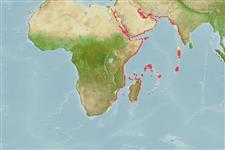Environment: milieu / climate zone / depth range / distribution range
Écologie
marin récifal; profondeur 5 - 20 m (Ref. 559). Subtropical; 30°N - 26°S, 34°E - 60°E
Western Indian Ocean: Red Sea and Persian Gulf south to Mozambique, Aldabra and Madagascar.
Taille / Poids / Âge
Maturity: Lm ? range ? - ? cm
Max length : 17.0 cm TL mâle / non sexé; (Ref. 559); poids max. publié: 33.13 g (Ref. 124708)
Épines dorsales (Total): 8; Rayons mous dorsaux (Total): 8-9; Épines anales 2; Rayons mous anaux: 6 - 8. Eyes slightly larger than snout. Preopercular edge serrated, preopercular ridge smooth, weakly denticulate at angle. Brownish or silver grey. 3 darker vertical bands on each side, the first including a black ocellus with yellow or white ring, last band near the base of caudal fin.
Inhabits coastal reefs, in shallow silty areas, and in mangroves (Ref. 9710).
Life cycle and mating behavior
Maturité | Reproduction | Frai | Œufs | Fécondité | Larves
Mouthbrooders (Ref. 240). Distinct pairing during courtship and spawning (Ref. 205).
Tortonese, E., 1986. Apogonidae. p. 803-809. In P.J.P. Whitehead, M.-L. Bauchot, J.-C. Hureau, J. Nielsen and E. Tortonese (eds.) Fishes of the north-eastern Atlantic and the Mediterranean. UNESCO, Paris. vol. 2. (Ref. 4738)
Statut dans la liste rouge de l'IUCN (Ref. 130435)
Menace pour l'homme
Harmless
Utilisations par l'homme
Plus d'informations
RéférencesAquacultureProfil d'aquacultureSouchesGénétiqueElectrophoresesHéritabilitéPathologiesTraitementNutrientsMass conversion
CollaborateursImagesStamps, Coins Misc.SonsCiguateraVitesseType de nageSurface branchialeOtolithesCerveauxVision
Outils
Articles particuliers
Télécharger en XML
Sources Internet
Estimates based on models
Preferred temperature (Ref.
123201): 25 - 29.1, mean 27.5 °C (based on 721 cells).
Phylogenetic diversity index (Ref.
82804): PD
50 = 0.5000 [Uniqueness, from 0.5 = low to 2.0 = high].
Bayesian length-weight: a=0.01479 (0.00690 - 0.03171), b=3.09 (2.91 - 3.27), in cm total length, based on LWR estimates for this (Sub)family-body shape (Ref.
93245).
Niveau trophique (Ref.
69278): 3.7 ±0.50 se; based on food items.
Résilience (Ref.
120179): Haut, temps minimum de doublement de population inférieur à 15 mois (Preliminary K or Fecundity.).
Fishing Vulnerability (Ref.
59153): Low vulnerability (10 of 100).
